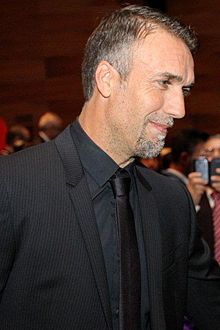 Batistuta in 2018 | |||||||||||||||||||||||||||||||||||
| Personal information | |||||||||||||||||||||||||||||||||||
|---|---|---|---|---|---|---|---|---|---|---|---|---|---|---|---|---|---|---|---|---|---|---|---|---|---|---|---|---|---|---|---|---|---|---|---|
| Full name | Gabriel Omar Batistuta[1] | ||||||||||||||||||||||||||||||||||
| Date of birth | 1 February 1969[1] | ||||||||||||||||||||||||||||||||||
| Place of birth | Reconquista, Santa Fe, Argentina[2] | ||||||||||||||||||||||||||||||||||
| Height | 1.85 m (6 ft 1 in)[2] | ||||||||||||||||||||||||||||||||||
| Position(s) | Striker | ||||||||||||||||||||||||||||||||||
| Youth career | |||||||||||||||||||||||||||||||||||
| 1987–1989 | Newell's Old Boys | ||||||||||||||||||||||||||||||||||
| 1982 | → Sportivo Italiano (loan) | ||||||||||||||||||||||||||||||||||
| Senior career* | |||||||||||||||||||||||||||||||||||
| Years | Team | Apps | (Gls) | ||||||||||||||||||||||||||||||||
| 1988–1989 | Newell's Old Boys | 24 | (7) | ||||||||||||||||||||||||||||||||
| 1989–1990 | River Plate | 21 | (4) | ||||||||||||||||||||||||||||||||
| 1990–1991 | Boca Juniors | 34 | (13) | ||||||||||||||||||||||||||||||||
| 1991–2000 | Fiorentina | 269 | (168) | ||||||||||||||||||||||||||||||||
| 2000–2003 | Roma | 63 | (30) | ||||||||||||||||||||||||||||||||
| 2003 | → Inter Milan (loan) | 12 | (2) | ||||||||||||||||||||||||||||||||
| 2003–2004 | Al-Arabi | 21 | (25) | ||||||||||||||||||||||||||||||||
| Total | 444 | (248) | |||||||||||||||||||||||||||||||||
| International career | |||||||||||||||||||||||||||||||||||
| 1991–2002 | Argentina | 78 | (56) | ||||||||||||||||||||||||||||||||
Medal record
| |||||||||||||||||||||||||||||||||||
| *Club domestic league appearances and goals | |||||||||||||||||||||||||||||||||||
Gabriel Omar Batistuta (Spanish pronunciation: [ɡaˈβɾjel oˈmaɾ βatisˈtuta];[note 1] born 1 February 1969) is an Argentine former professional footballer. During his playing career, Batistuta was nicknamed Batigol ([batiˈɣol])[3] as well as El Ángel Gabriel ([el ˌaŋxel ɣaˈβɾjel]; Spanish for Angel Gabriel). Regarded as one of the best strikers of all time, he was named by Pelé in the FIFA 100 list of the world's greatest living players in 2004.[4]
After beginning his career in Argentina in 1988 with Newell's Old Boys, followed by River Plate and Boca Juniors where he won titles, Batistuta played most of his club football with Serie A club Fiorentina in Italy; he is their all-time top scorer in Serie A with 151 goals.[5] When Fiorentina was relegated to Serie B in 1993, Batistuta stayed with the club and helped them return to the top-flight league a year later. He became an icon in Florence; the Fiorentina fans erected a life-size bronze statue of him in 1996, in recognition of his performances for the club.[6] Despite winning the Coppa Italia and the Supercoppa Italiana with the club in 1996, he never won the Serie A title with Fiorentina, but when he moved to Roma in 2000 for €36 million – the highest fee ever paid for a player over the age of 30 until Cristiano Ronaldo moved from Real Madrid to Juventus in 2018 – he won the 2000–01 Serie A title.[7] After a brief loan spell with Inter Milan in 2003, he played his last two seasons in Qatar with Al-Arabi before he retired in 2005.[8]
At international level, Batistuta was Argentina's all-time leading goalscorer with 56 goals in 78 official matches,[note 2] a record he held until 21 June 2016, when he was surpassed by Lionel Messi.[11] He participated in three FIFA World Cups, scoring 10 goals, making him Argentina's second top scorer in the competition after Messi, and the joint tenth-highest World Cup goalscorer of all time.[12] Batistuta is the only player in football history to score two hat-tricks in different World Cups. With the Argentina national team he won two consecutive Copa América titles (1991 and 1993), the 1993 CONMEBOL–UEFA Cup of Champions, and the 1992 FIFA Confederations Cup.
- ^ a b "Gabriel Batistuta". socceerway.com. Retrieved 9 June 2022.
- ^ a b "Gabriel Batistuta". AS Roma. Archived from the original on 8 February 2002. Retrieved 9 June 2022.
- ^ Giancarlo Rinaldi (29 August 2014). "When Batigol could not stop scoring". Football Italia. Retrieved 18 June 2017.
- ^ "Pele's list of the greatest". BBC Sport. 4 March 2004. Retrieved 15 June 2013.
- ^ "Gabriel Batistuta – Fiorentina Icon, Calcio Legend : " rarely has a player come to symbolise their club in the same way that Batistuta defined Fiorentina during nine seasons from 1991 to 2000"". goaldentimes.org. Retrieved 11 February 2015.
- ^ Cite error: The named reference
Timewas invoked but never defined (see the help page). - ^ "Roma-scudetto, racconta il tuo 17 giugno 2001" (in Italian). Corriere dello Sport. 17 June 2012. Archived from the original on 12 May 2014. Retrieved 15 June 2013.
- ^ "Argentine striker Gabriel Batistuta retires from soccer". USA Today. 14 March 2005. Retrieved 15 June 2013.
- ^ "Batistuta: You can't teach the art of goalscoring". FIFA.com. FIFA. 24 January 2021. Archived from the original on 13 November 2021. Retrieved 13 November 2021.
- ^ Cite error: The named reference
RSSSF – Batistutawas invoked but never defined (see the help page). - ^ "Lionel Messi becomes Argentina's all-time top goalscorer overtaking record set by Gabriel Batistuta - Mirror Online". Daily Mirror. 22 June 2016.
- ^ "Batistuta bids farewell". FIFA.com. 14 March 2005. Archived from the original on 28 June 2016. Retrieved 2 July 2016.
Cite error: There are <ref group=note> tags on this page, but the references will not show without a {{reflist|group=note}} template (see the help page).